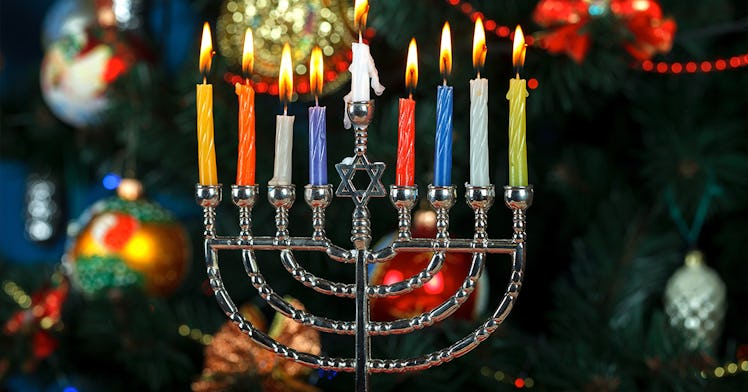Raising Kids With A Menorah, A Christmas Tree, And No Confusion
These are the best ways of diffusing religious tensions with your spouse during the Christian and Jewish holidays.

The holidays is a time when many couples navigate the tricky terrain of “Wait … who believes what?” In the interfaith couples counseling business, this time of year — the holidays, on which both Christmas and Hannukah fall — is so fraught it even has its own name: The December Dilemma. If that’s ringing a (jingle) bell for you, heed the advice of therapist Judith Kellner, who has over 20 years experience helping Christian and Jewish couples deal with Christmasukkah. It doesn’t have to a point of friction. In fact, Kellner believes interfaith couples have some child-rearing advantages baked into their religious differences.
Be Clear With Your Spouse About What Religion Means
“It’s not simple like when we all lived in villages, but your kid will know how to live with differences – that’s a gift.”Maybe you’re a lapsed Jew and your partner is rosary-carrying Catholic; maybe you both have only vague connections to family traditions that you nevertheless want to maintain. Whatever the case, you each need to understand where the other is coming from in matters of faith before you can hope to communicate a clear message to your kids. Kellner uses the example of a Jew who hasn’t been to synagogue since his Bar Mitzvah, but for whom the history and language and literature of Judaism is important – “His partner might not understand that Judaism is as much a culture as it is a religion. They just need to know what it means for him to be a Jew.”
Kids Have To Belong To The Family, Not A Religion
“There is no confusion if the parents aren’t confused,” says Kellner. When parents are open and honest which each other about their religious beliefs – and how they need those beliefs to be honored within the context of the family – their kids will take that explanation as their starting point. “Help your kid negotiate that. We live in a globalized world and we need to live with complexity. It’s not simple like when we all lived in villages, but your kid will know how to live with differences – that’s a gift, which helps them negotiate things later on.”
Don’t Be A Grinch (Or Whatever The Jewish Equivalent Of A Grinch Is)
“There’s no confusion if the parents aren’t confused.” If tension between you and your partner over religion remains unresolved, you run the risk of your kid feeling the need to choose one or the other. That’s a choice that should be made when they’re old enough to grasp it, and one that has to come from a position of freedom rather than fear. What you don’t want to do is “create questions that the child may not have the courage to ask, because the parents aren’t talking about it. One has to feel safe to talk about things that may not feel comfortable,” says Kellner. And what you really don’t want is for your kid to associate the holidays in particular with tension, but you knew that already (unless you’re a Grinch).
Whatever The Particulars, Embrace Your Inner Humanist
What matters most is communicating what you and your partner stand for. “We’re all human beings, we all want to feel safe and connected and accepted,” says Kellner. “We believe in God, and we practice kindness toward other people.” Maybe you don’t believe in God, but whatever – you get the picture.
But Wait! There Are More Benefits To Raising An Interfaith Kid
By Kellner’s estimation, kids who are raised by parents of different faiths learn about tolerance and how to be practical. “Mom accepts dad’s belief system because it came from his family legacy. What mom believes comes from her legacy. Interfaith can teach acceptance and respect and support, and that there is more than one way to be comforted.” Of course, that last bit only works if you follow the other bits.
This article was originally published on